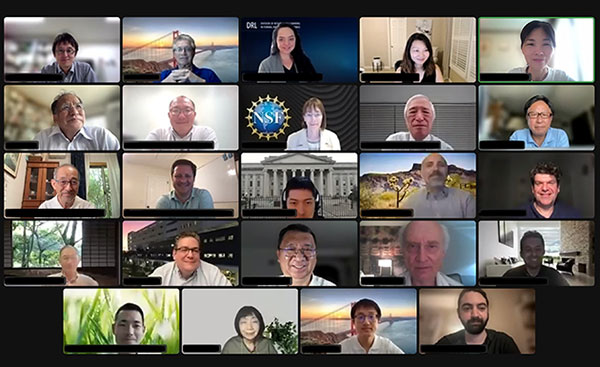News & Topics
NSF-JST Joint Mid-term Meeting—Digital Science for Society—
Strategic International Collaborative Research Program (SICORP)
The SICORP program has supported four joint research projects in the field of “Digital Science for Post-COVID-19 Society” since 2021 in collaboration with the National Science Foundation (NSF).
https://www.jst.go.jp/inter/english/program_e/sicorp_e/usa.html
In this field, it is essential to promote research that emphasizes “the integration of the natural sciences and the humanities and social sciences” and “the building of relationships with communities” as a shared awareness between Japan and the United States.
For more information, please refer to JSTnews published on January 2022.
https://www.jst.go.jp/pr/jst-news/backnumber/2021/202201/index.html
We held an interim report meeting online on June 28 and 29, 2023. In the beginning of the first day, the principal investigators (PI) from the four currently undergoing projects presented the progress of their research and discussed future directions for the research with Dr. Kazuo Iwano, program officer (PO) of JST, Dr. David Corman, program director of NSF, and six program advisers in a Q&A session.
In the second half of the day, five doctoral students and an assistant professor, who studied at a research institute in a partner country for a short duration under the framework of the program that promoted overseas study for young researchers, conducted lightning talks. Next, there was an exchange of views on research activities and life in the United States moderated by Dr. Iwano. Participants spoke with a fresh outlook about their research activities and the unfamiliar lifestyle during their first experience in the United States.
The second day session was open for the public and began with opening remarks by Mr. Brandon Possin from the United States Embassy and Dr. Behrooz Alex Shirazi, Deputy Division Director of Computer and Network Systems, NSF Computer and Information Science and Engineering (CISE). Then, the PIs of the four projects held a round-table discussion. Difficulties in building relationships with the community during the social implementation stage of research work was highlighted as a problem shared by Japan and the United States. Further, the importance of gaining trust from the community from the initial stages of research was indicated.
The panel discussion entitled “Mapping the Potential of Digital Science to Create a Better Future” was held during the final stages of the meeting. The participants were Assistant Professor James Weimer, Vanderbilt University; Professor Hiroshi Nishiura, Kyoto University; Program Director Sara Kiesler, Social Behavioral and Economic Sciences, NSF; Professor Li Xiong, Emory University; and Mr. Junya Yabuuchi, NHK Senior Commentator. Facilitated by Dr. David Corman, the five participants reviewed the pandemic and discussed the possibilities of digital science in the future from multiple perspectives.
In retrospect, they noted that although data-based science played a significant role in providing information to policy makers, scientific communication was inadequate, and there was a lack of an integrated approach that incorporated psychological perspectives and cultural differences among groups represented by synchrony pressures.
Regarding future outlooks, they pointed out that establishing a preparedness that includes diverse perspectives and stakeholders is critical. This requires incorporating science communication into STEM (Science, Technology, Engineering, and Mathematics) education, building a multidisciplinary network of experts even for non-emergency situations, and making efforts to build relationships with the community such that various discussions and collaborations can seamlessly continue in an emergency.
After the event, we received feedback from participants, such as the program was structured in a conducive manner to generate stimulating discussions, and that it was a highly informative two-day meeting with a wealth of discussions on major topics that would contribute to future research initiatives. The smooth overall progress of the meeting conducted by Dr. Iwano and accurate comments from the advisors further facilitated the discussions. It was also mentioned that the participation of NHK Senior Commentator from the media in the panel session was an important step for the future activities of the digital science community.
We will continue to promote projects that focus on community relations in this field.

Researchers and stakeholders in Japan and the United States.
